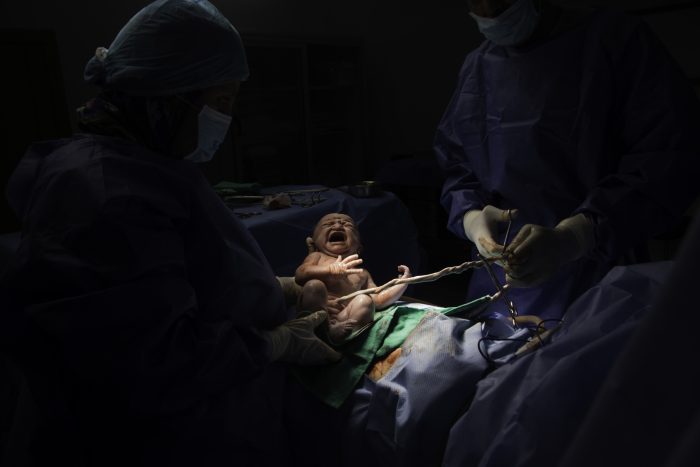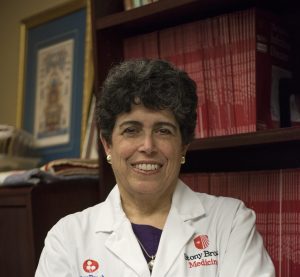NYS plans to test newborns for CMV, a virus that can damage hearing, affect learning

Starting later this month or early next month, all children born in New York state will receive testing for congenital cytomegalovirus, an infection that can cause hearing loss and learning deficits.
The state will track children who test positive for this virus, which is related to the virus for chickenpox, herpes and mononucleosis, over the years after their birth to provide early intervention amid the development of any symptoms and to provide a baseline for understanding how the virus may affect the growth and development of other children born with the virus.
Mothers who contract CMV, which is the most common congenital virus and the leading nongenetic cause of deafness in children, for the first time while they are pregnant can transmit the virus to their developing child.
Local doctors suggested that this testing, which other states would likely examine closely, provided a welcome opportunity to gather information about their children, even if the test raised questions or concerns about what the diagnosis means.
“Knowledge is power,” said Dr. Sharon Nachman, chief of the division of pediatric infectious diseases at Stony Brook Children’s Hospital. “The more you can tell a parent about what’s going on, the more they can make informed decisions.”
To be sure, Nachman anticipated that more parents initially might opt out of having their child’s screen result reported in their newborn record, until pediatricians and obstetricians have had a chance to talk with them.
There will be a “lot more opting out in the beginning” until parents understand what the test means and how it might help in understanding a virus that could affect their children’s health and development, Nachman said.
One in 200 babies
New York State recently received a contract from the Eunice Kennedy Shriver National Institute of Child Health and Human Development to add screening for this virus for a period of a year.

Parents of babies who test positive will receive referrals to infectious disease specialists across the state for follow-up and evaluation.
The state predicts about one out of every 200 newborns may test positive for the virus, according to the New York State Department of Health website.
Over half of the adults in the U.S. have had CMV, while most people don’t know they’ve had it because they show no symptoms.
Those who develop symptoms have sore throats, fever, fatigue and swollen glands, which are the kind of nonspecific conditions that characterize the body’s response to infections from other viruses.
Opt-out options
While all babies will receive a congenital CMV test, parents can choose to opt out of having their children’s screen result reported in their newborn screen record.
The state urges parents who would like to opt out to do so quickly, as newborn screen reports are complete five to seven days after birth.
Parents have several ways to opt out. They can scan the QR code found on their brochure, which will bring them to the Newborn Screening Program website and opt out portal. They can also remove and fill out the opt-out form in the parent brochure and give it to the hospital to submit with the newborn screen specimen.
Alternatively, parents can email a picture of the completed opt-out form to [email protected] or they can call the program at 518-473-7552 and press option five. Finally, parents can mail the opt-out form to the NYS Newborn Screening Program in Albany.
First steps
Nachman is co-leading one of the 11 units across the state in pediatric infectious disease with Dr. Andrew Handel.
The teams will meet once a month to discuss issues around CMV.
“One of the goals of the project, which is why it’s funded by NICHD is can we identify who is at risk” to develop problems such as hearing loss.
Among the numerous unanswered questions the group hopes to address is whether early treatment would be a way to prevent problems from developing, even among children who test positive but are asymptomatic. Giving medication to all children who test positive comes with its own problems, as the medication for CMV has side effects, said Nachman.
It’s not like “taking a dose of Tylenol, given several times a day for weeks at a time,” said Nachman.
While women who have had CMV prior to pregnancy are unlikely to transmit the virus, Nachman discourages people from intentionally contracting the virus before becoming pregnant.
“We don’t encourage people to go out and get CMV so they’ll be cleared by the time they’re pregnant,” in part because people can develop symptoms, conditions and secondary infections after having the virus.
By monitoring the health of children after their diagnosis, the state hopes to understand more about the virus and its effects.
“We need to follow enough children long enough” to be able to address those medical questions and concerns, Nachman said.
The study might be able to find markers that could predict who might be at risk for hearing loss in the early years of a child’s life, she said.
During hearing screens that could occur every six months, children born with CMV can receive early intervention.
“The sooner we see something, the sooner we can act on it,” Nachman said.
As for developmental issues, children who show even a glimmer of a developmental delay can also receive early intervention.
At this point, Stony Brook has been participating in clinical trials for a vaccine, which, if approved, could be administered to adolescents.
The trials for the vaccine, which could last for 10 years, are still in the early stages of development.






